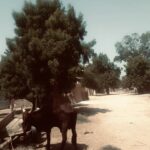
Baba Aji Fariya, an elderly man with a weathered face and tired eyes, gazes down a sandy path leading out of his village, Fariya, in Borno State, northeastern Nigeria. His expression is heavy, mirroring the struggles of his community.
Over the last two decades, Fariya has grown from a small settlement to a community of over 20,000 residents, fuelled by the arrival of people displaced by the Boko Haram insurgency. Yet, this growth has not been matched by the development of critical infrastructure.
“The need for a hospital has increased, but not even a dispensary exists,” Baba Aji lamented. Medical care remains a significant challenge for Fariya residents. The nearest hospital is in Dalaram, about 2-3 kilometres from their home. It is a journey complicated by the poor roads, which become virtually impassable during the rainy season.
“This year, we experienced a cholera outbreak,” he told HumAngle. “It’s very difficult to transport sick people to the nearest hospital, and some even die before reaching there. Pregnant women also endure immense suffering during labour because of the delays in getting to the hospital. No roads and no nearby hospital—it’s a tough situation.”
For Baba Aji and other residents in Fariya, a “standard dispensary would make a huge difference.” “We need a hospital and good roads,” he noted.
Yafalmata Grema, a mother residing in the community, echoed Baba Aji’s concerns, recounting how a neighbour’s 10-year-old son died of high fever because there was no local chemist to offer first aid. “This loss could have been prevented,” she lamented.
Kiribiri’s silent struggles
Kiribiri, another underserved community in Borno’s Jere Local Government Area (LGA), faces similar hardships. Home to about 5000 residents, it lacks schools, hospitals, power supply, and good roads. Health emergencies often require a trip to Muna, the nearest community with medical facilities, which is a journey fraught with difficulties due to unreliable transport and good roads.
“All the basic amenities that a community under democratic rule should enjoy are missing here,” said Tahiru Kiribiri, a resident. “During the last elections, people like Satomi Ahmed (representative of Jere federal constituency) came to this community to canvas for votes. He promised to address all our issues, but up until now, nothing has been done.”
Tahiru told HumAngle that the Kiribiri Youth Association even visited Satomi Ahmed at his residence to remind him of his promises. “He assured us he hasn’t forgotten about us, so we are still waiting for his intervention. As citizens, if we can’t even enjoy these basic amenities, what is the essence of electing leaders?” Tahiru added.
For parents like Massa Lawan Kiribiri, another resident, the absence of a school is particularly distressing. “Our children are just roaming around, and this is harmful to their future,” he said. “Without access to education, we fear these children may grow up without proper guidance.”
In addition to education, maternal healthcare is another challenge. Yazara Mai Modu, a mother, said pregnancies are often a struggle for women as “most commercial drivers refuse to come to Kiribiri”.
“This forces women to wait hours for transportation, even in emergencies. Sometimes, we have to go down to Muna to find a driver, and by the time they come back to pick up a patient, an hour has passed. For someone who is critically ill or in labour, an hour is too long to wait,” she added.
Heroes amid adversity
Despite the dire circumstances, individuals in these communities strive to make a difference. In Fariya, Alai Kura, one of the few residents with a car, often transport the sick to the nearest hospital. “He tries his best, but sometimes we cannot get him because he has his responsibilities,” Baba Aji noted.
The Civilian Joint Task Force (CJTF) often assists during emergencies, especially at night. “They provide their vehicles to transport women in labour to either the General Hospital, which is 3-4 kilometres away or the hospital in Dalaram, which is 2–3 kilometres away,” Yafalmata explained.
“Without them, things would be much worse,” she added.
More government promises and delays
Local leaders have repeatedly raised these concerns with the government. In Fariya, community leader Kazallah Ali has written “countless letters” to local authorities pleading for action.
“This community has existed for at least 100 years. Our population has grown,” he said. “Yet, we’ve struggled to access healthcare and proper roads all this time.
“We urgently need the facilities I’ve mentioned—a hospital and better roads,” Ali added.
In Kiribiri, councillor Lawan Bukar acknowledged the community’s challenges, citing flooding as a recent obstacle to progress. “I am fully aware of these issues and have forwarded them to the government,” he noted.
Bukar suggested that parents consider enrolling their children in nearby communities like Dutsman and Bulamatiri, where standard schools are available until a school is built in Kiribiri.
Regarding healthcare, he mentioned that while Kiribiri has mobile clinics, they are inadequate and lack the capacity of proper hospitals found in urban areas.
Bukar disclosed that plans are underway to provide solar-powered lights and road repairs. “I promise to meet with her [referring to Hajiya Inna Galadima, the Chairperson of Jere LGA] again to remind her of these longstanding concerns.”
This report was produced as part of the 2024 HumAngle Accountability Fellowship, with support from MacArthur Foundation.
In northeastern Nigeria’s Fariya community, over 20,000 residents face inadequate infrastructure after rapid growth due to displacement by Boko Haram.
The lack of medical facilities, such as a hospital or dispensary, has severe consequences, including cholera outbreaks and preventable deaths of residents. Residents are calling for improved healthcare and road infrastructure.
Similarly, Kiribiri, in Borno’s Jere LGA, struggles with the absence of essential amenities like schools and hospitals, causing hardships during health emergencies.
Promised government interventions have not materialized, leaving locals like Tahiru Kiribiri and Massa Lawan Kiribiri disillusioned. Both communities rely on local heroes and the Civilian Joint Task Force to fill gaps in emergency responses, while local leaders push for government action and improvements.
